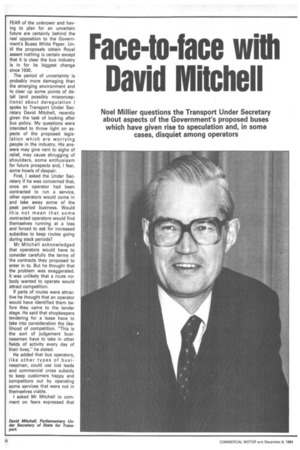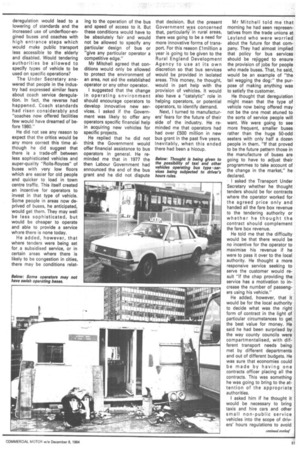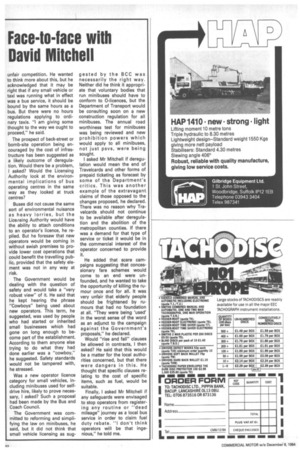Face-to-face with David Mitchell
Page 52

Page 53

Page 54

If you've noticed an error in this article please click here to report it so we can fix it.
FEAR of the unknown and having to plan for an uncertain future are certainly behind the real opposition to the Government's Buses White Paper. Until the proposals obtain Royal assent nothing is certain except that it is clear the bus industry is in for its biggest change since 1930.
The period of uncertainty is probably more damaging than the emerging environment and to clear up some points of detail (and possibly misconceptions) about deregulation I spoke to Transport Under Secretary David Mitchell, recently given the task of looking after bus policy. My questions were intended to throw light on aspects of the proposed legislation which are worrying people in the industry. His answers may give vent to sighs of relief, may cause shrugging of shoulders, some enthusiasm for future prospects and, I fear, some howls of despair.
First, I asked the Under Secretary if he was concerned that, once an operator had been contracted to run a service, other operators would come in and take away some of the peak period business. Would this not mean that some contracted operators would find themselves running at a loss and forced to ask for increased subsidies to keep routes going during slack periods?
Mr Mitchell acknowledged that operators would have to consider carefully the terms of the contracts they proposed to enter in to. But he thought that the problem was exaggerated. It was unlikely that a route nobody wanted to operate would attract competition.
If parts of routes were attractive he thought that an operator would have identified them before they came to the tender stage. He said that shopkeepers tendering for a lease have to take into consideration the likelihood of competition. "This is the sort of judgement businessmen have to take in other fields of activity every day of their lives," he stated.
He added that bus operators, like other types of businessmen, could use lost leads and commercial cross subsidy to keep customers happy and competitors out by operating some services that were not in themselves viable.
I asked Mr Mitchell to comment on fears expressed that deregulation would lead to a lowering of standards and the increased use of underfloor-engined buses and coaches with high entrance steps which would make public transport less accessible to the elderly and disabled. Would tendering authorities be allowed to specify types of vehicle to be used on specific operations?
The Under Secretary answered that people in the industry had expressed similar fears about coach service deregulation. In fact, the reverse had happened. Coach standards had risen considerably and "coaches now offered facilities few would have dreamed of before 1980."
He did not see any reason to expect that the critics would be any more correct this time although he did suggest that there is a trade-off between less sophisticated vehicles and super-quality "Rolls-Royces" of buses with very low floors which are easier for old people and quicker to load in town centre traffic. This itself created an incentive for operators to invest in that type of vehicle. Some people in areas now deprived of buses, he anticipated, would get them. They may well be less sophisticated, but would be cheaper to operate and able to provide a service whare there is none today.
He added, however, that where tenders were being set for a subsidised service, or in certain areas where there is likely to be congestion in cities, there may be conditions relat ing to the operation of the bus and speed of access to it. But these conditions would have to be absolutely fair and would not be allowed to specify any particular design of bus or "give any particular operator a competitive edge."
Mr Mitchell agreed that conditions would only be allowed to protect the environment of an area, not aid the established operator or any other operator.
I suggested that the change in operating environment should encourage operators to develop innovative new services. I asked if the Government was likely to offer any Operators specific financial help in acquiring new vehicles for specific projects.
He replied that he did not think the Government would offer financial assistance to bus operators in general. He reminded me that in 1977 the then Labour Government had announced the end of the bus grant and he did not dispute that decision. But the present Government was concerned that, particularly in rural areas, there was going to be a need for more innovative forms of transport. For this reason E1million a year is going to be given to the Rural England Development Agency to use at its own discretion so that bus services would be provided in isolated areas. This money, he thought, would in part help with the provision of vehicles. It would also have a "catalytic" role in helping operators, or potential operators, to identify demand.
Next, I turned to manufacturers' fears for the future of their side of the industry. He reminded me that operators had had over £500 million in new bus grant in the past five years. Inevitably, when this ended there had been a hiccup. Mr Mitchell told me that morning he had seen representatives from the trade unions at Leyland who were worried about the future for that company. They had almost implied that policy for bus services should be rejigged to ensure the provision of jobs for people who made buses. That, he said, would be an example of "the tail wagging the dog:" the purpose of making anything was to satisfy the customer.
He thought that deregulation might mean that the type of vehicle now being offered may not be the one most atuned to the sorts of service people will want. We were going to see more frequent, smaller buses rather than the huge 50-odd seaters with only half a dozen people in them. "If that proved to be the future pattern those in the manufacture of buses are going to have to adjust their programmes to take account of the change in the market," he declared.
I asked the Transport Under Secretary whether he thought tenders should be for contracts where the operator worked for the agreed price only and handed all the fare box revenue to the tendering authority or whether he thought the contract should complement the fare box revenue.
He told me that the difficulty would be that there would be no incentive for the operator to maximise his revenue if he were to pass it over to the local authority. He thought a more responsive service seeking to serve the customer would result "if the chap providing the service has a motivation to increase the number of passengers using his vehicle."
He added, however, that it would be for the local authority to decide what was the right form of contract in the light of particular circumstances to get the best value for money. He said he had been surprised by the way county councils were compartmentalised, with different transport needs being met by different departments and out of different budgets. He was sure that economies could be made by having one contracts officer placing all the contracts. This was something he was going to bring to the attention of the appropriate authorities.
I asked him if he thought it would be necessary to bring taxis and hire cars and other small non-public service vehicles into the scope of drivers' hours regulations to avoid unfair competition. He wanted to think more about this, but he acknowledged that it may be right that if any small vehicle or taxi was running what in effect was a bus service, it should be bound by the same hours as a bus. But there were no hours regulations applying to ordinary taxis. "I am giving some thought to the way we ought to proceed," he said.
The prospect of back-street or bomb-site operation being encouraged by the cost of infrastructure has been suggested as a likely outcome of deregulation. Would there be a problem, I asked? Would the Licensing Authority look at the environmental implications of bus operating centres in the same way as they looked at truck centres?
Buses did not cause the same sort of environmental nuisance as heavy lorries, but the Liceosing Authority would have the ability to attach conditions to an operator's licence, he replied. But he foresaw that new operators would be coming in without swish premises to provide lower cost operations that could benefit the travelling public, provided that the safety element was not in any way at risk.
The Government would be dealing with the question of safety and would take a "very robust view" of it. He said that he kept hearing the phrase "Cowboys" being used about new operators. This term, he suggested, was used by people who had started or inherited small businesses which had gone on long enough to become part of the establishment. According to them anyone else trying to do what they had done earlier was a "cowboy," he suggested. Safety standards would not be tampered with, • he stressed.
Was a new operator licence category for small vehicles, including minibuses used for selfdrive hire, likely to prove necessary, I asked? Such a proposal had been made by the Bus and Coach Council.
The Government was committed to reforming and simplifying the law on minibuses, he said, but it did not think that small vehicle licensing as sug gested by the BCC was necessarily the right way. Neither did he think it appropriate that voluntary bodies that run minibuses should have to conform to 0-licences, but the Department of Transport would be consulting soon on a new construction regulation for all minibuses. The annual road worthiness test for minibuses was being reviewed and new prohibition powers which would apply to all minibuses, not just psvs, were being sought.
I asked Mr Mitchell if deregulation would mean the end of Travelcards and other forms of prepaid ticketing as forecast by some of the Department's critics. This was another example of the extravagant claims of those opposed to the changes proposed, he declared. There was no reason why Travelcards should not continue to be available after deregulation and the abolition of the metropolitan counties. If there was a demand for that type of service or ticket it would be in the commercial interest of the operator concerned to provide it.
He added that scare campaigns suggesting that concessionary fare schemes would come to an end were unfounded, and he wanted to take the opportunity of killing the rumour once and for all. It was very unfair that elderly people should be frightened by rumours that had no foundation at all. "They were being 'used' in the worst sense of the word as an adjunct to the campaign against the Government's proposals," he declared.
Would "rise and fall" clauses be allowed in contracts, I then asked? He said that this would be a matter for the local authorities concerned, but that there were dangers in this. He thought that specific clauses relating to the cost of specific items, such as fuel, would be suitable.
Finally, I asked Mr Mitchell if any safeguards were envisaged to stop operators from registering any routine or "dead mileage" journey as a local bus service in order to claim fuel duty rebate. "I don't think operators will be that ingenious," he told me.




























































































